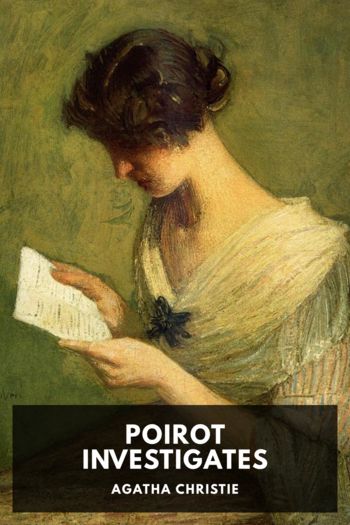The Murder on the Links by Agatha Christie (classic book list .txt) 📕

- Author: Agatha Christie
Book online «The Murder on the Links by Agatha Christie (classic book list .txt) 📕». Author Agatha Christie
By Agatha Christie.
Table of Contents Titlepage Imprint Dedication The Murder on the Links I: A Fellow Traveller II: An Appeal for Help III: At the Villa Geneviève IV: The Letter Signed “Bella” V: Mrs. Renauld’s Story VI: The Scene of the Crime VII: The Mysterious Madame Daubreuil VIII: An Unexpected Meeting IX: M. Giraud Finds Some Clues X: Gabriel Stonor XI: Jack Renauld XII: Poirot Elucidates Certain Points XIII: The Girl with the Anxious Eyes XIV: The Second Body XV: A Photograph XVI: The Beroldy Case XVII: We Make Further Investigations XVIII: Giraud Acts XIX: I Use My Grey Cells XX: An Amazing Statement XXI: Hercule Poirot on the Case! XXII: I Find Love XXIII: Difficulties Ahead XXIV: “Save Him!” XXV: An Unexpected Denouement XXVI: I Receive a Letter XXVII: Jack Renauld’s Story XXVIII: Journey’s End Colophon Uncopyright ImprintThis ebook is the product of many hours of hard work by volunteers for Standard Ebooks, and builds on the hard work of other literature lovers made possible by the public domain.
This particular ebook is based on digital scans available at the Internet Archive.
The writing and artwork within are believed to be in the U.S. public domain, and Standard Ebooks releases this ebook edition under the terms in the CC0 1.0 Universal Public Domain Dedication. For full license information, see the Uncopyright at the end of this ebook.
Standard Ebooks is a volunteer-driven project that produces ebook editions of public domain literature using modern typography, technology, and editorial standards, and distributes them free of cost. You can download this and other ebooks carefully produced for true book lovers at standardebooks.org.
To my husband
A fellow enthusiast for detective stories, and to whom I am indebted for much helpful advice and criticism.
I believe that a well-known anecdote exists to the effect that a young writer, determined to make the commencement of his story forcible and original enough to catch and rivet the attention of the most blasé of editors, penned the following sentence:
“ ‘Hell!’ said the Duchess.”
Strangely enough, this tale of mine opens in much the same fashion. Only the lady who gave utterance to the exclamation was not a Duchess!
It was a day in early June. I had been transacting some business in Paris and was returning by the morning service to London where I was still sharing rooms with my old friend, the Belgian ex-detective, Hercule Poirot.
The Calais express was singularly empty—in fact, my own compartment held only one other traveller. I had made a somewhat hurried departure from the hotel and was busy assuring myself that I had duly collected all my traps when the train started. Up till then I had hardly noticed my companion, but I was now violently recalled to the fact of her existence. Jumping up from her seat, she let down the window and stuck her head out, withdrawing it a moment later with the brief and forcible ejaculation “Hell!”
Now I am old-fashioned. A woman, I consider, should be womanly. I have no patience with the modern neurotic girl who jazzes from morning to night, smokes like a chimney, and uses language which would make a Billingsgate fishwoman blush!
I looked up now, frowning slightly, into a pretty, impudent face, surmounted by a rakish little red hat. A thick cluster of black curls hid each ear. I judged that she was little more than seventeen, but her face was covered with powder, and her lips were quite impossibly scarlet.
Nothing abashed, she returned my glance, and executed an expressive grimace.
“Dear me, we’ve shocked the kind gentleman!” she observed to an imaginary audience. “I apologize for my language! Most unladylike, and all that, but Oh, Lord, there’s reason enough for it! Do you know I’ve lost my only sister?”
“Really?” I said politely. “How unfortunate.”
“He disapproves!” remarked the lady. “He disapproves utterly—of me, and my sister—which last is unfair, because he hasn’t seen her!”
I opened my mouth, but she forestalled me.
“Say no more! Nobody loves me! I shall go into the garden and eat worms! Boohoo! I am crushed!”
She buried herself behind a large comic French paper. In a minute or two I saw her eyes stealthily peeping at me over the top. In spite of myself I could not help smiling, and in a minute she had tossed the paper aside, and had burst into a merry peal of laughter.
“I knew you weren’t such a mutt as you looked,” she cried.
Her laughter was so infectious that I could not help joining in, though I hardly cared for the word “mutt.” The girl was certainly all that I most disliked, but that was no reason why I should make myself ridiculous by my attitude. I prepared to unbend. After all, she was decidedly pretty. …
“There! Now we’re friends!” declared the minx. “Say you’re sorry about my sister—”
“I am desolated!”
“That’s a good boy!”
“Let me finish. I was going to add that, although I am desolated, I can manage to put up with her absence very well.” I made a little bow.
But this most unaccountable of damsels frowned and shook her head.
“Cut it out. I prefer the ‘dignified disapproval’ stunt. Oh, your face! ‘Not one of us,’ it said. And you were right there—though, mind you, it’s pretty hard to tell nowadays. It’s not everyone who can distinguish between a demi and a duchess. There now, I believe I’ve shocked you again! You’ve been dug out of the backwoods, you have. Not that I mind that. We could do with a few more of your sort. I just hate a fellow who gets fresh. It makes me





Comments (0)